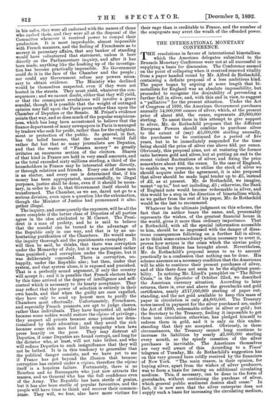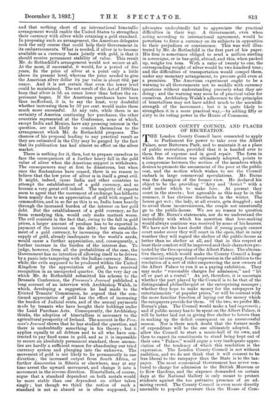THE INTERNATIONAL MONETARY CONFERENCE.
would have volunteered that statement, unless it bore rE resolutions in favour of international bimetallism directly on the Parliamentary inquiry, and after it has which the American delegates submitted to the Brussels Monetary Conference were not at all successful in been made, anything like the hushing up of the investiga- sary, in order to do it, that Government itself should be meant " up to," but not including, ; otherwise, the Bank transformed. The Chamber, as we see, dared not go to a of England note would become redeemable in silver, and -serious division, even upon a question like the exhumation, this would be a step in the direction of bimetallism which, though the Minister of Justice had pronounced it alto- as we gather from the rest of his paper, Mr. de Rothschild and that nothing short of an international bimetallic arrangement would enable the United States to strengthen their currency with silver while retaining a gold standard. In proposing such an arrangement, the American delegates took the only course that could help their Government in its embarrassments. What is needed, if silver is to become available as a currency basis jointly with gold, is that it should receive permanent stability of value. This result Mr. de Rothschild's arrangement would not secure at all. At the most, if successful, it would, for a period of five years, fix the price of silver at a point only a little above its present level, whereas the price needed to give the American silver dollar its par value is about 60d. per ounce. And it is not certain that even the lower level could be maintained. The net result of the Act of 1890 has been that silver is 3d. an ounce lower than before the ex- periment began. If the American purchases have been thus ineffectual, it is, to say the least, very doubtful whether increasing them by 50 per cent. would make them much more successful. At any rate, while there is no certainty of America continuing her purchases, the other countries represented at the Conference, none of which, except India and Mexico, have any pressing interest in the question, are not likely to commit themselves to the arrangement which Mr. de Rothschild proposes. The chances of his proposal leading to any practical result as they are estimated in the City may be gauged by the fact that its publication has had almost no effect on the silver market.
There is nothing for it, then, but to prepare ourselves to face the consequences of a further heavy fall in the gold value of silver when the American support is withdrawn. The consequences may at first be disastrous, but when once the fluctuations have ceased, there is no reason to believe that the low price of silver is in itself a great evil. It might, indeed, cause India and other countries to attempt the establishment of a gold currency, and so become a very great evil indeed. The majority of experts seem to agree that the movement of exchange has hitherto been mainly due to an appreciation of gold with regard to commodities, and in so far as this is so, India loses heavily through the increased burden of the interest on her gold debt. But the establishment of a gold currency, so far from remedying this, would only make matters worse. The evil consists in the fact that, owing to the fall in gold prices, a larger amount of produce has to be exported in payment of the interest on the debt ; but the establish- ment of a gold currency, by increasing the strain on the supply of gold, already inadequate to the world's needs, would cause a further appreciation, and, consequently, a further increase in the burden of the interest due. To judge, however, from all the probabilities of the case, the Government has no intention of allowing itself to be driven by a panic into tampering with the Indian currency. Mean- while, the evils supposed to be produced within the United Kingdom by the appreciation of gold, have received recognition in an unexpected quarter. On the very day on which Mr. de Rothschild submitted his scheme to the Brussels Conference, the Freeman's Journal published a long account of an interview with Archbishop Walsh, in which, developing a suggestion he had made to the Evicted Tenants' Commission, he argued that the con- tinued appreciation of gold has the effect of increasing the burden of Judicial rents, and of the annual payments nude by tenants who have bought their holdings under the Land Purchase Acts. Consequently, the Archbishop thinks, the adoption of bimetallism is necessary to the agricultural prosperity of Ireland. The account in the Free- man's Journal shows that he has studied the question, and there is undoubtedly something in his theory ; but it applies equally to all debtors and to all who have con- tracted to pay fixed sums in gold, and as it is impossible to secure an absolutely permanent standard, these anoma- lies are hardly a sufficient reason for abandoning our tried currency system and plunging into the unknown. The movement of gold is not likely to lie permanently in one direction ; the increased output from South Africa, or further discoveries in Siberia or elsewhere, may at any time arrest the upward movement, and change it into a movement in the reverse direction. Bimetallists, of course, argue that a standard dependent on both metals would be more stable than one dependent on either taken singly ; but though we think the notion of such a standard is not so absurd as is often supposed, its advocates undoubtedly fail to appreciate the practical difficulties in their way. A Government, even when acting according to international agreement, would be powerless to force a currency on its subjects in opposition to their prejudices or convenience. This was well illus- trated by Mr. de Rothschild in the first part of his paper. His firm is sometimes obliged to send a million sterling in sovereigns, or in bar-gold, abroad, and this, when packed up, weighs ten tons. With a ratio of twenty to one, the corresponding weight of silver would be two hundred tons ; and the difficulties of transportation would compel them, under any monetary arrangement, to procure gold even at a premium. The American experiment ought to be a warning to all Governments not to meddle with currency questions without understanding precisely what they are doing ; and the warning may soon be of practical value for ourselves. Archbishop Walsh's adherence to the principles of bimetallism may not have added much to the scientific strength of the movement ; but it is quite likely to strengthen it in a more practical way,—by adding fifty or sixty to its voting power in the House of Commons.



















































 Previous page
Previous page